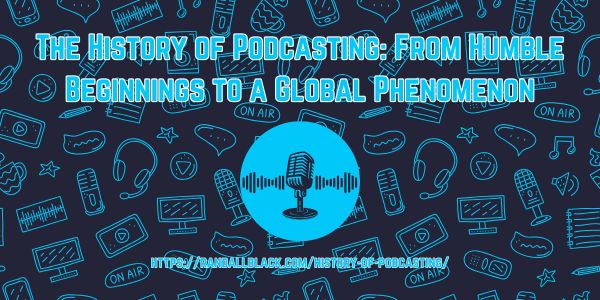Introduction
Podcasting has become a mainstream medium for storytelling, education, and entertainment, with millions of listeners tuning in daily. But the origins of podcasting date back to the early 2000s, when a few pioneers saw the potential of RSS technology to distribute audio content. Over the years, podcasting has evolved from a niche internet subculture to a billion-dollar industry. In this post, we’ll take a deep dive into the history of podcasting, exploring its origins, key milestones, and where it’s headed in the future.
The Early Days: RSS and the Birth of Podcasting
The foundation of podcasting can be traced to the development of Really Simple Syndication (RSS), a web feed format that allows users to subscribe to content updates. One of the key figures in this development was Dave Winer, a software developer and creator of the RSS feed. In 2000, Winer introduced the enclosure tag in RSS, allowing media files to be attached to blog posts. This laid the groundwork for what would later become podcasting.
At the same time, Adam Curry, a former MTV VJ and internet entrepreneur, recognized the potential of this technology for delivering audio content. In 2004, Curry and developer Dave Winer worked together to create a system that would automatically download audio files using RSS feeds. Curry developed iPodder, a script that enabled users to download MP3 files and sync them to their iPods—hence the term podcasting, a combination of “iPod” and “broadcast.”
The Term “Podcast” is Born
The word “podcast” first appeared in print in February 2004, when British journalist Ben Hammersley used it in a Guardian article discussing the rise of amateur audio content online. The term quickly caught on, and by the end of 2004, podcasting was becoming a recognized medium. That same year, Danny Gregoire registered the domain podcast.net, further solidifying the name.
Apple’s Influence and Mainstream Recognition
A major turning point came in 2005, when Apple added native podcast support to iTunes with version 4.9. This update allowed users to easily subscribe to and download podcasts, significantly increasing their visibility. Apple also introduced a dedicated podcast directory, making it easier for content creators to reach new audiences. By the end of 2005, major media outlets, including NPR and the BBC, had launched their own podcasts, giving the format additional credibility.
The Rise of Independent Podcasting
As podcasting grew in popularity, it became a platform for independent creators to share their voices. Unlike traditional radio, podcasting had no gatekeepers—anyone with a microphone and an internet connection could start their own show. Platforms like Libsyn (founded in 2004) and Blubrry provided hosting services specifically tailored to podcasters, making it easier than ever to distribute content.
During this period, many influential podcasts emerged, such as This Week in Tech (TWiT), hosted by Leo Laporte, and The Ricky Gervais Show, which became one of the most downloaded podcasts of its time. The success of these early shows demonstrated the potential of podcasting as a viable media format.
The “Serial” Effect and the Podcast Boom
While podcasting had been steadily growing throughout the 2000s, it wasn’t until 2014 that the medium truly exploded into the mainstream. This was largely due to the release of Serial, a true crime podcast produced by Sarah Koenig and the team at This American Life. Serial’s gripping storytelling captivated millions of listeners and introduced many people to the concept of podcasts for the first time.
Following Serial, the podcast industry experienced rapid growth. Major companies and celebrities began investing in podcasting, leading to an explosion of new content. Spotify, Google, and Amazon all entered the podcasting space, launching their own platforms and acquiring podcast networks.
Podcasting Becomes Big Business
As podcast listenership grew, so did monetization opportunities. The rise of programmatic advertising, sponsorships, and subscription-based models allowed podcasters to generate significant revenue. Companies like Patreon and Supercast enabled podcasters to monetize directly from their audience, while advertising platforms like Midroll helped connect brands with popular shows.
In 2019, Spotify made a major move into podcasting, acquiring Gimlet Media, Anchor, and Parcast for hundreds of millions of dollars. This signaled that podcasting was no longer just a hobbyist platform—it had become a major part of the media landscape.
Podcasting 2.0 and the Decentralization Movement
Despite the industry’s growth, concerns over centralization and corporate control have led to the emergence of Podcasting 2.0, an initiative led by Adam Curry and Dave Jones. Podcasting 2.0 aims to preserve the open nature of podcasting by developing new features such as Value for Value (V4V) micropayments, transcripts, chapter markers, and decentralized hosting.
One key aspect of Podcasting 2.0 is its integration with Bitcoin-based payments through the Lightning Network, allowing listeners to support creators directly. This movement seeks to ensure that podcasting remains independent and resistant to the walled-garden approach adopted by major tech companies.
The Future of Podcasting
Podcasting continues to evolve with advancements in AI-driven content creation, interactive podcasts, and immersive audio experiences. The industry is projected to keep growing, with more personalized recommendations, live podcasting features, and enhanced monetization models.
As the landscape shifts, one thing remains constant: podcasting’s power lies in its ability to give everyone a voice. Whether you’re an independent creator or a major media company, the potential for storytelling and connection through podcasts is greater than ever.
Conclusion
From its origins as a niche technology experiment to its current status as a dominant media force, podcasting has come a long way. The journey from RSS enclosures and iPod syncing to multi-million dollar acquisitions and decentralized movements shows the resilience and adaptability of the medium. As long as podcasting remains an open and accessible platform, its future will continue to be bright.
If you’re interested in starting your own podcast, there’s never been a better time. Whether you’re an aspiring storyteller or a business looking to reach a new audience, the opportunities in podcasting are endless.
